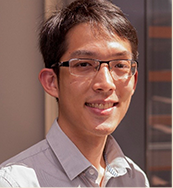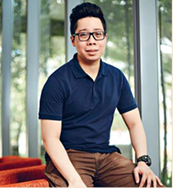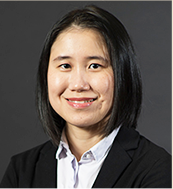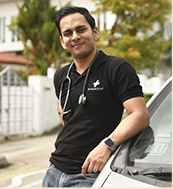|
|
| |
| HOME >> ALUMNI IN THE NEWS |
|
|
|
| |
 |
| |
SingHealth Duke-NUS Scientific Congress
|
|
|
The SingHealth Duke-NUS Scientific Congress which was into its fifth edition was successfully held over two days, from 21 - 22 September 2018 at the Academia, with over 3,000 delegates congregating in what was to be the biggest healthcare-related scientific event in Singapore and around the region.
The event attracted leaders, healthcare professionals, academics and researchers across the healthcare professions to share the latest medical developments and scientific advances in innovation, research and education.
Dr Vivian Balakrishnan, Minister for Foreign Affairs, served as Guest of Honour and Prof Mary Klotman, Dean, Duke University School of Medicine, gave the keynote speech.
Duke-NUS was proud to see that Dr Shashendra Aponso, Class of 2015, and Dr Chong Jia Loon, MD-PhD student, were invited to speak at the event.
|
| |
|

|
|
|
Dr Chong Jia Loon, 2014 Intake
|
|
|
Dr Chong Jia Loon is an MD-PhD Candidate at Duke-NUS Medical School and holds a Bachelor of Engineering (Bioengineering) degree from the National University of Singapore. He completed his thesis defense on the 4th of September and is currently in his final year of the MD Programme.
As part of his PhD dissertation project, Jia Loon has been actively involved in a series of studies related to the development and validation of an instrument that matches health and social services to needs in an ageing population called the Simple Segmentation Tool.
Arising from the conclusion of the SingHealth Duke-NUS Scientific Congress, we decided to ask him about his presentation. "I was invited to speak at the Health Services Research Symposium of the Congress. The title of the symposium was 'Population Segmentation: What, Why and How'. To prepare for my role as one of the speakers, I consolidated research results from my PhD thesis that may be of interest to my audience and created relevant presentation slides. It was an honour to be given the opportunity to share my research work with fellow colleagues in healthcare," said Jia Loon.
Jia Loon has always felt motivated in the area of research. He added that his decision to focus on health services research is also related to his interest in improving the way healthcare is delivered for purposes of optimising population health. "Research is a powerful instrument for helping us solve problems. Besides pushing the boundaries of knowledge, it provides opportunities to significantly and positively impact society," said Jia Loon.
While sharing that research provides a potentially meaningful career with opportunities to work on challenging problems which affect many people, Jia Loon also acknowledged that one challenge as an aspiring clinician scientist was balancing clinical and research responsibilities, of which both require a significant amount of time and focus.
We asked what advice he would give to aspiring researchers. "Exploratory research often involves a fair amount of failures. Therefore, supportive mentors and peers are invaluable for providing guidance and support. It is also important to remember that luck plays a role in research. As Gary Player once said: the harder you work, the luckier you get!" said Jia Loon. Jia Loon sees a bright future in the career prospects of a clinician scientist. "As healthcare systems attempt to cope with increasing demands of an ageing population and technological disruptions, health services research will be important for purposes of evaluating and developing innovative yet cost-effective means of meeting population healthcare needs," emphasised Jia Loon. He foresees that medicine will become increasingly personalised due to several factors: a more discerning and educated population, increased uptake of innovative digital technology and increased capability of healthcare providers.
Jia Loon is also an active member of Gordon Arthur Ransome College and frequently advises the junior students in the college. During his free time, Jia Loon relaxes by going for runs or spends time with his family and friends. As our interview came to an end, we wished him good luck and success in all his endeavours.
|
| |
|
|
|
|
|
Dr Shashendra Aponso, Class of 2015
|
|
|
Dr Shashendra Aponso (whom most of us know as Dr Sashen), a Duke-NUS alumnus of the Class of 2015 with a passion for public speaking, went on stage at the Academia auditorium for the ethical debate at the 2018 SingHealth Duke-NUS Scientific Congress.
Duke-NUS Alumni Relations caught up with the young doctor over a cup of coffee - the rich aroma of Arabica providing the perfect backdrop to the conversation that was to follow, on Dr Sashen's life in and outside hospital and his recent experience at the debate.
Born in Oman, to Sri Lankan parents, Sashen grew up as the quintessential third culture kid. Having completed his schooling in Oman, he graduated from Stanford University (USA) in 2011 with an Honours degree in Human Biology before moving to Singapore to attend Duke-NUS Medical School for his MD degree. Since graduating with an MD in 2015, Dr Sashen has pursued training as a SingHealth Internal Medicine resident and is currently posted to the department of Dermatology at Singapore General Hospital.
"Well, it was truly an honour to be part of the ethical debate for the SingHealth Duke-NUS Scientific Congress", Dr Sashen admitted with a smile. "Although I have had many opportunities for public speaking during my years in school, college, medical school and residency, debate was one area in which I had relatively less exposure. So when I was invited to participate in the ethical debate, I saw it as a chance to go beyond my comfort zone. Little did I know that I would be debating against such an eloquent team, the members of which included Prof Toh Han Chong - an extremely articulate orator whom I look up to. I certainly learnt a lot from him, just by sharing the same stage. The debate itself was an exciting experience. I had the pleasure of working together with Dr Camilla Wong (Director, Allied Health, Sengkang Health) and Andy Sim (Principal Medical Social Worker) whose energy and good humour made it all the more enjoyable. Apart from the tremendously valuable learning experience, it was a privilege to also listen to other speakers at the Congress presenting their work", he told me.
"So why medicine?" I asked him. "When I was little, I was blessed with very caring family doctors. I suppose they inspired me and that's what kindled the spark. Later on, during my O-level years when I shadowed doctors, I knew that this was what I wanted to do for the rest of my life. I wanted a career that was both an art and a science, one that intertwined personal interaction and intellectual challenges - and medicine was the perfect fit".
For someone who described the medical profession as both art and science, it came as no surprise that Dr Sashen finds himself drawn to the field of dermatology, his current rotation. He feels that one of the biggest factors that piqued his interest towards dermatology is the visual component to dermatological diagnosis. "Painting has been a hobby of mine ever since I can remember, and I sometimes feel that examining, describing and understanding a skin condition is similar to critiquing and fully appreciating an art piece." I wonder whether Dr Sashen might have become an accomplished painter if he had not become a doctor. I learnt that he still paints during his free time, and has an online portfolio of his works at www.artbysashen.com.
Being a medical doctor also bring along several challenges in the course of Dr Sashen's work. One of the obvious challenges, is having to effectively manage time between his clinical work and the many examinations that he has had during his Internal Medicine residency while still making time for career development (research projects & reading), personal growth and wellness.
When asked what advice he would he give to aspiring doctors, his reply was somewhat philosophical. "Be prepared for a lifetime of learning, always be kind and most importantly take care of yourself as your own health and happiness are vital in order for you to take care of your patients".
"It is truly a wonderful time to be a doctor", Dr Sashen added. "Advances in scientific research and technology have already allowed us to live in the ‘hospital of tomorrow' - novel drug therapies, artificial intelligence and innovative collaborations with other fields, to name a few. Yet, all our advances bring their own challenges. Our rising aging population means more elderly who require medical care and therefore special considerations both in terms of health care and social support".
Dr Sashen enjoys the outdoors and he makes sure to schedule "green time" into his off day. He enjoys Singapore's wilder nature trails such as MacRitchie and Sungei Buloh as much as he relishes the manicured landscapes of the botanic gardens - his favourite running route. One of his favourite nature treks was during his recent summer trip to Scotland where he was enchanted by the beauty of the Scottish Highlands (featured in his photograph).
|
| |
|

|
|
|
Dr Brian Chan, Class of 2017
|
|
At Your Service - Our Alumnus Dr Brian Chan, Class of 2017 was featured in the last issue of the AlumNUS magazine.
"I wanted to become a doctor to serve others when they are at their most vulnerable," he said. Read more here.
|
| |
|

|
|
|
Dr Cecilia Kwok, Class of 2011
|
|
|
An inspiring graduate from the pioneer Class of 2011, Dr Cecilia Kwok, who is today an Associate Consultant in the Department of Psychiatry, Singapore General Hospital, was featured in the Sep - Oct 2018's Singapore Health issue.
A full extract of the article from the Sep - Oct 2018's Singapore Health Issue had been extracted for your reading pleasure:
Dying of a broken heart
According to Dr Cecilia Kwok, grief can place a huge stress on one's emotional and physical systems. Physiological changes brought on by major emotional stress may significantly increase the risk of a heart attack. "This type of stress can increase blood pressure and heart rate, raise stress hormone level, constrict blood vessels, disrupt cholesterol-filled plaques in coronary arteries, and make blood more likely to clot, which would increase the risk of a heart attack up to 21 times within the day.
Sleeping poorly, eating badly or missing medications for chronic illnesses during the grieving process can further raise the risk, she added.
Intense emotional stress from grief can also trigger a rare heart condition known as stress cardiomyopathy where the heart muscle suddenly weakens.
"The exact cause is not known, but experts think that a surge in stress hormones such as adrenalin can trigger changes in the heart muscle that prevent it from contracting effectively," she said, noting that the condition is more commonly seen in post-menopausal women, possibly due to their lower levels of heart-protective oestrogen.
People who are already at risk for heart disease and heart attacks, because they suffer from conditions like high blood pressure or high cholesterol levels, may be especially prone to a heart attack following the loss of a love one, said Dr Kwok.
But not everyone experiences such a dramatic response to grief. Suffering mental distress is a natural response to a loss, such as the death of a loved one or even the loss of a job or relationship, said Dr Kwok. In the elderly, grief can be due to the loss of independence and health.
As a person comes to terms with loss, a series of emotions sets in. According to the model for the grieving process proposed by Swiss-American psychiatrist Elisabeth Kubler-Ross, there are five stages, but not everyone goes through all of them or in a fixed order, said Dr Kwok.
"The most common initial reaction is shock. The person may feel that the loss is not real or he is in a dream, and this state of shock or detachment can last from a few days to weeks, after which the grieving process starts," she said.
After this stage, reality - and the pain of loss - which can trigger feelings of anger and frustration, said Dr Kwok.
The next two stages are known as the bargaining and depression stages. During the bargaining stage, the person may dwell on what he could have done to prevent the loss, while sadness sets in during the depression stage, she said.
Finally, there is acceptance.
"In this final stage of grief, you accept the reality of the loss. Although you still feel sad, you can start to move on with your life," said Dr Kwok.
How long someone grieves depends on the type of loss, age, relationship with the person who has passed away, belief and support systems, personality, as well as physical and mental health, she said.
What is known is that time heals most wounds. "In general, after a year to 18 months, the grief will be less likely to be at the forefront of your mind. You may continue to feel sad, but you can still get on with your life and it won't overwhelm you," said Dr Kwok.
Some people may find it difficult to cope with their loss, and when grief persists or worsens, it can turn into a debilitating condition known as complicated grief.
"Even when you're grieving, there will be something that lifts your spirits, such as when you see your children. In the case of complicated grief, nothing will make the grieving person feel better," said Dr Cecilia Kwok.
Daily life is disrupted because the person can only focus on his loss. Some people miss their loved one so much, they find little meaning in life or living.
"For a grieving person, simple everyday tasks may feel insurmountable, and he may find it difficult to keep up. It may be helpful for friends and family to offer practical help such as assisting with the funeral arrangements, and daily chores like cooking and taking care of the children or laundry," said Dr Kwok.
Emotional support is also important, but Dr Kwok cautioned against offering comments that minimises the griever's strong emotions, such as "he's in a better place now", "she's had a good life" and I got over my loss quickly".
"Everybody grieves differently. It's hard for us to imagine what it is like for another person. Acknowledge their feelings, don't make judgements, and provide emotional support to the person by just being there for him," she said.
|
| |
|
 |
|
|
Dr Shravan Verma, Class of 2014
|
|
Doctor stepped up to help injured biker at Raffles Quay: He's CEO of medical service Speedoc -
an app that brings a house call doctor directly to where you are 24/7.
Our Alumnus Dr Shravan Verma, Class of 2014 was featured on the STOMP news where he was spotted helping an injured biker at Raffles Quay.
Read more here and here.
|
| |
|
|
SingHealth RiSE Awards 2018
|
|
A happy moment for Duke-NUS!
At the SingHealth RiSE Awards, our alumni bagged several awards.
We are happy to share the LIST OF Duke-NUS winners!
Quality Improvement Project Award
Project: Reducing length of stay for patients admitted with acute gout
Dr Tan Tze Chin (Class of 2011, Internal Medicine - Rheumatology)
Inspiring Resident-Educator Award
Dr Dypti Lulla (Class of 2016, Family Medicine)
Outstanding Resident Award
- Dr Lim Miao Shan (Class of 2011, Internal Medicine - Gastroenterology)
- Dr Tan Tze Chin (Class of 2011, Internal Medicine - Rheumatology)
- Dr Goh Junyang Ken (Class of 2012, Internal Medicine - Respiratory Medicine)
- Dr Kaavya Narasimhalu (Class of 2012, Internal Medicine - Neurology)
- Dr Neo Ghim Hoe (Class of 2012, Orthopaedic Surgery)
- Dr Tan Pei Ling (Class of 2012, Internal Medicine - Rehabilitation Medicine)
- Dr Zhang Zewen (Class of 2013, Internal Medicine - Medical Oncology)
- Dr Tay Yu Ling (Class of 2014, Internal Medicine - Geriatric Medicine)
- Dr Seow Yuan Bin, Dominique (Class of 2015, Pathology)
- Dr Ho Shu Fang (Class of 2016, Emergency Medicine)
Resident Committee Appreciation Award
Dr Goh Glenn (Class of 2015, Family Medicine)
More information can be found here.
SingHealth Residency Graduands
Dr Angela Renayanti Dharmawan (Class of 2011, General Surgery)
Dr Eunizar Binte Omar (Class of 2011, Emergency Medicine)
Dr Ong Shi Yeu (Class of 2012, Internal Medicine - Haematology)
Dr Chang Wei Yin Esther (Class of 2012, Internal Medicine - Medical Oncology)
Dr Kaavya Narasimhalu (Class of 2012, Internal Medicine - Neurology)
Dr Yong Ming Hui (Class of 2012, Internal Medicine - Neurology)
Dr Goh Junyang Ken (Class of 2012, Internal Medicine - Respiratory Medicine)
Dr Tay Wei Lin (Class of 2012, Internal Medicine - Endocrinology)
NUHS Residency Graduands
Dr Andrew Green (Class of 2012, Preventive Medicine)
Dr Ho Gim Hin (Class of 2012, Internal Medicine - Gastroenterology
NUG Residency Graduands
Dr Daniel Yong (Class of 2011, Urology)
Dr Lim Wei Shyan (Class of 2012, Psychiatry)
Dr Charmain Heah (Class of 2013, Emergency Medicine)
SingHealth Best Junior Doctors Awards
Best House Officer Award
This award recognizes top performing House Officers for theirs outstanding contributions and service, as nomination by their respective Heads of Department.
Dr Yeo Junjie (Class of 2017)
National Outstanding Clinician Scientist Resident Awards
This national award recognises Clinician Scientist Residents for their outstanding performance and contribution in clinical training and research to improve patient care. The winners are selected by a panel comprising members from the Specialist Accreditation Board Research Committee and Research Training Review Panel. Only two awards were given this year, and both were awarded to SingHealth Residents.
Dr Ku Chee Wai (Class of 2013, Obstetrics and Gynaecology)
|
|
|
|
Alumni Relations Office
Duke-NUS Medical School
8 College Road, Level 4, Singapore 169857
Email : alumni@duke-nus.edu.sg
|
Web : www.duke-nus.edu.sg
|
|